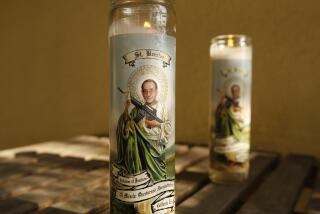Judge Levitt Denies Bias Against Attorney
- Share via
Responding swiftly to a challenge to his fairness, San Diego County Superior Court Judge Jack Levitt insisted Friday he has no bias against a criminal defense lawyer whom he jailed for contempt 13 years ago.
Attorney Charles Khoury earlier this week asked that Levitt be disqualified from presiding in a competency hearing for accused triple-slayer Billy Ray Waldon. Khoury charged that Levitt had demonstrated vindictiveness and bias in a series of confrontations with the defense bar dating back to his citation of Khoury for contempt in 1974.
But in court papers filed Friday, Levitt said his conflicts with other defense lawyers--including cases that resulted in him being scolded by an appellate court--had no relevance to the Waldon case.
Levitt said, moreover, he “had forgotten” that he found Khoury in contempt following the 1974 trial of a defendant who pleaded not guilty by reason of insanity in a police shooting case. Levitt ordered Khoury jailed briefly for making improper statements during closing arguments in the case.
Khoury’s protest against Levitt is the second so-called “challenge for cause” leveled at the judge in the last month. The first--filed by a public defender who said Levitt had exhibited bias against him and a client in a case last year--was upheld by Presiding Judge Thomas G. Duffy three weeks ago.
Normally, lawyers and court officials say, such challenges are extremely rare. But the defense bar’s long-simmering dissatisfaction with Levitt--a fastidious, tough-sentencing judge who has served on the Superior Court since 1972--has bubbled into frequent confrontations in the last few months.
In his court filing, Levitt said much of Khoury’s challenge was legally faulty, asserting it was based on irrelevancies, hearsay and conclusions. The judge insisted, too, that he should not have to face challenges over events that occurred long in the past.
“An honest attempt to sanction an attorney in contempt should not be a basis for challenge for cause . . . particularly when it occurred 13 years ago,” Levitt said.
A hearing on the challenge has not yet been scheduled.
More to Read
Sign up for Essential California
The most important California stories and recommendations in your inbox every morning.
You may occasionally receive promotional content from the Los Angeles Times.













